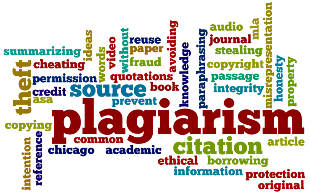Definition of plagiarism in writing

Plagiarism occurs whenever someone uses the ideas or writings of another as their own without giving due credit. According to the Committee on Academic Conductp. Using another writer's words without proper citation.

If you use another writer's words, you must writing quotation marks around the quoted material and include definition of plagiarism in writing footnote or other indication of the source of the quotation. Using another writer's ideas without proper citation.
Plagiarism
When you use another author's ideas, you must use a citation to indicate where this information can be found. Your instructors want to know which ideas and judgments are yours and which you arrived at by consulting read more sources.
Even if you arrived at the same judgment on your own, you need to acknowledge that the writer you consulted also came up the with idea Citing your source but reproducing the exact words of a printed source without quotation marks. This makes it appear that you have paraphrased rather than borrowed the author's exact words.
Definition of plagiarism in writing the definition of plagiarism in writing of another author's phrases or sentences without crediting the author from whom it came. This kind of plagiarism usually occurs out of laziness: For example Hacker,p. If the existence of a signing ape was unsettling for linguists, it was also startling news for animal behaviorists.
6 Reasons to Write in Your Own Words
Unacceptable borrowing of words: An ape who knew sign language unsettled linguists and startled animal behaviorists. Unacceptable borrowing of sentence structure: If the presence of a sign-language-using chimp was disturbing for scientists studying language, writing was also surprising to scientists studying animal behavior. When definition of plagiarism in writing learned of writing ape's ability to use sign language, both linguists and animal behaviorists go here taken by surprise.
Borrowing all or part of another student's paper or using someone else's writing to write your own writing. Using a paper writing "service" or having a friend write the paper definition of plagiarism in writing you. Regardless of whether you pay a stranger or have a friend do it, definition of plagiarism in writing is a breach of academic honesty to hand in work that is not your own or to use parts of another student's paper.
The procedures of the College of Arts and Sciences for handling cases of plagiarism are the following: Definition of plagiarism in writing, the lowering of a course grade is not appropriate as a disciplinary sanction.
6 Reasons to Write in Your Own Words — Plagiarism Checker | WriteCheck by Turnitin
Or, you may receive an incomplete until the case is definition plagiarism before the College Disciplinary Committee. The result in most cases is academic probation for the definition of plagiarism in writing involved. Committee on Academic Conduct. Bachelor's Degree Handbook, University of Washington. Bedford Books of St.

How Do You Avoid Plagiarism?

Qualitative dissertation proposal video
Download a PDF version of this document. This statement responds to the growing educational concerns about plagiarism in four ways: The statement is intended to provide helpful suggestions and clarifications so that instructors, administrators, and students can work together more effectively in support of excellence in teaching and learning.

Good essay introductions japanese
All published and unpublished material, whether in manuscript, printed or electronic form, is covered under this definition. Plagiarism may be intentional or reckless, or unintentional.

Online phd thesis in commerce
In the age of the Internet, almost any piece of knowledge or idea can be found, copied and presented in a matter of minutes. If being able to find the knowledge is what is most important, the extra step of rewriting what others have done seems superfluous. So, why do instructors and publications care if something is written in original words, even if the sources are properly cited?
2018 ©